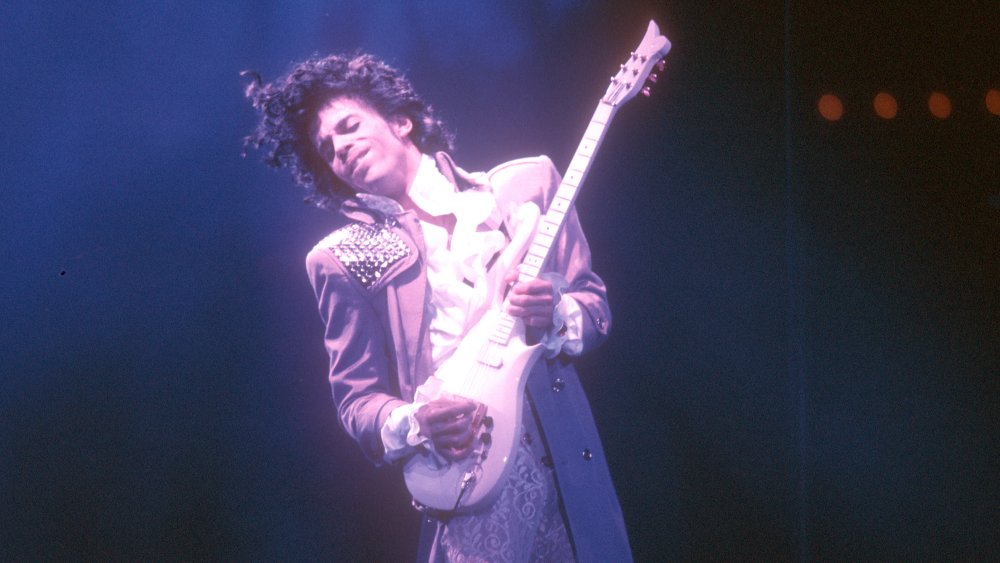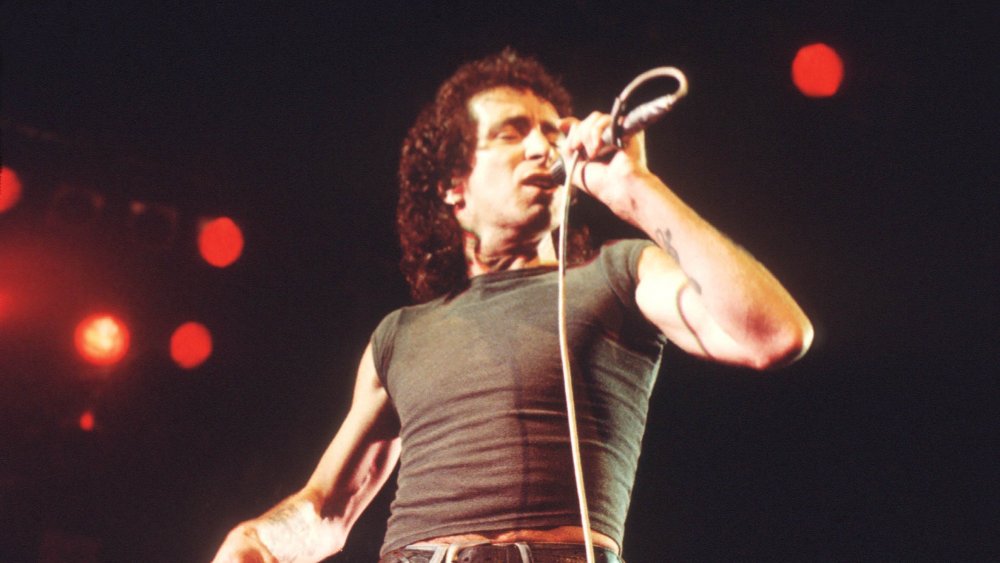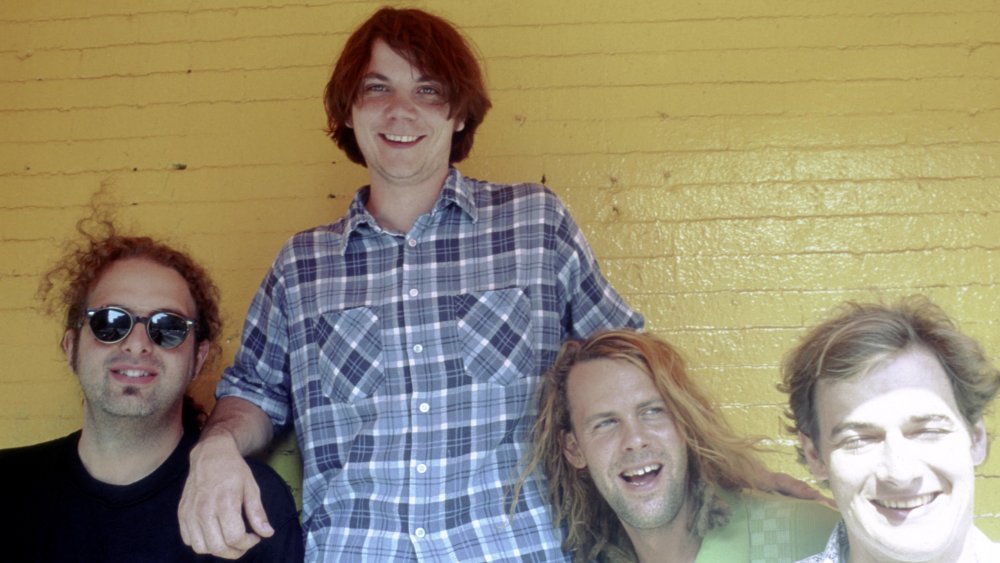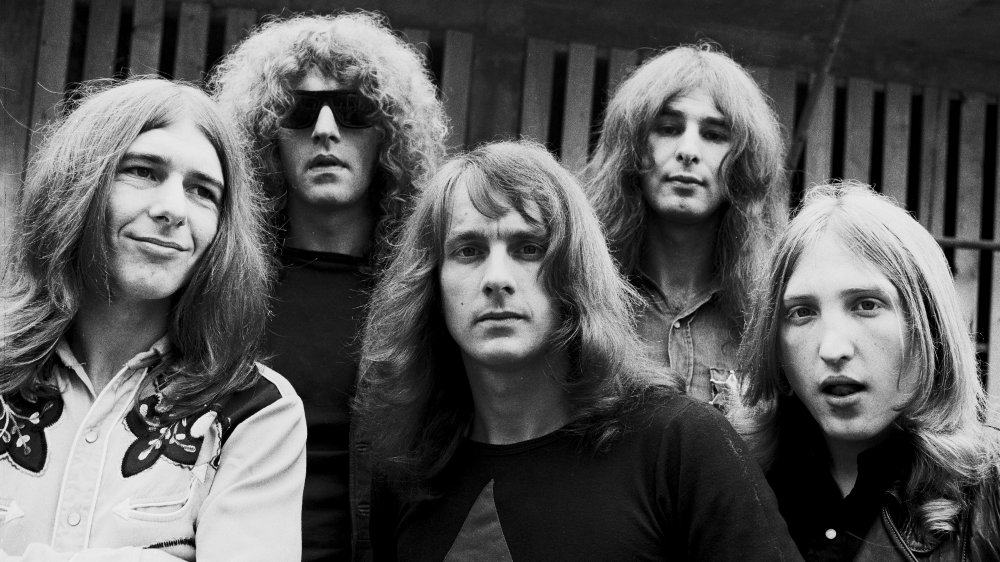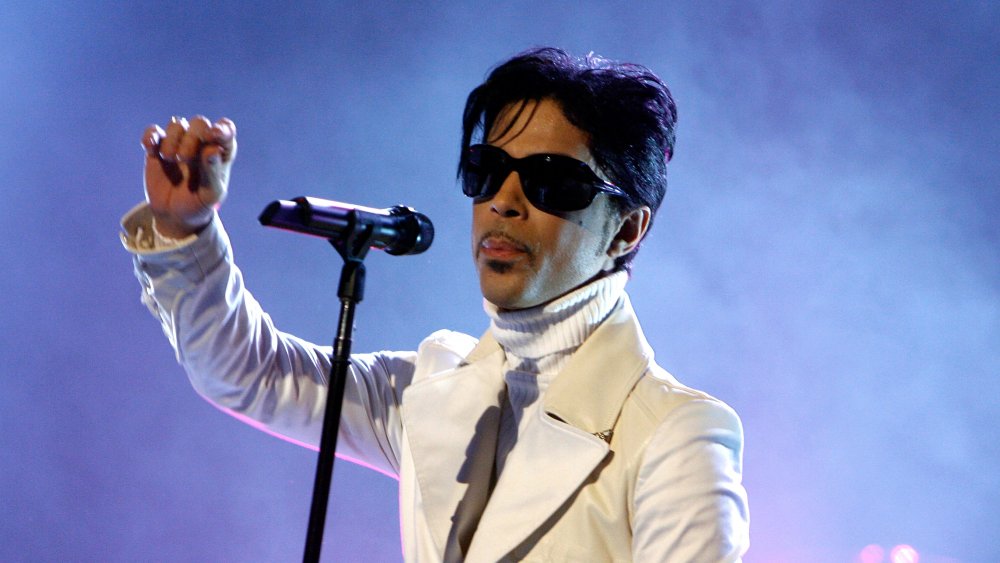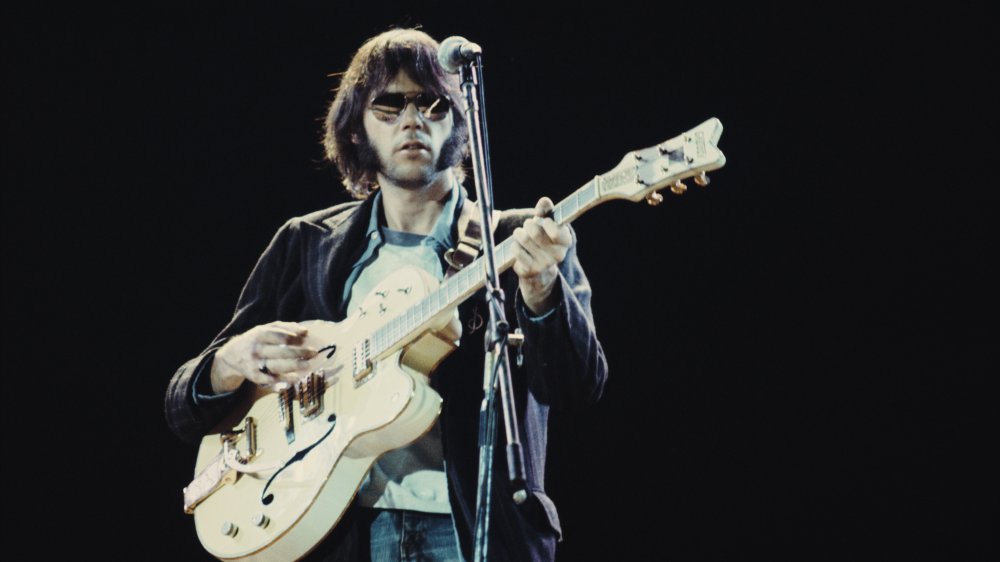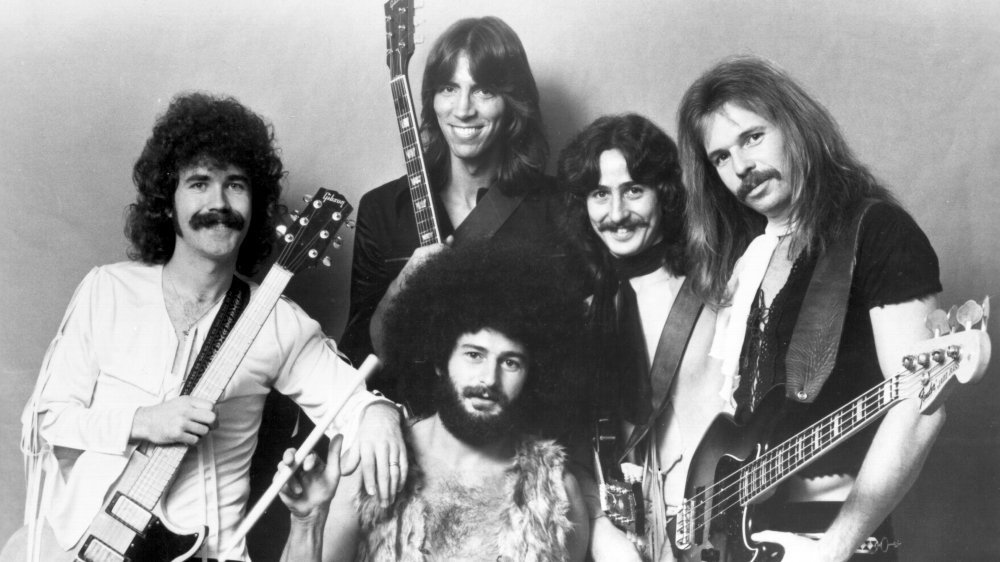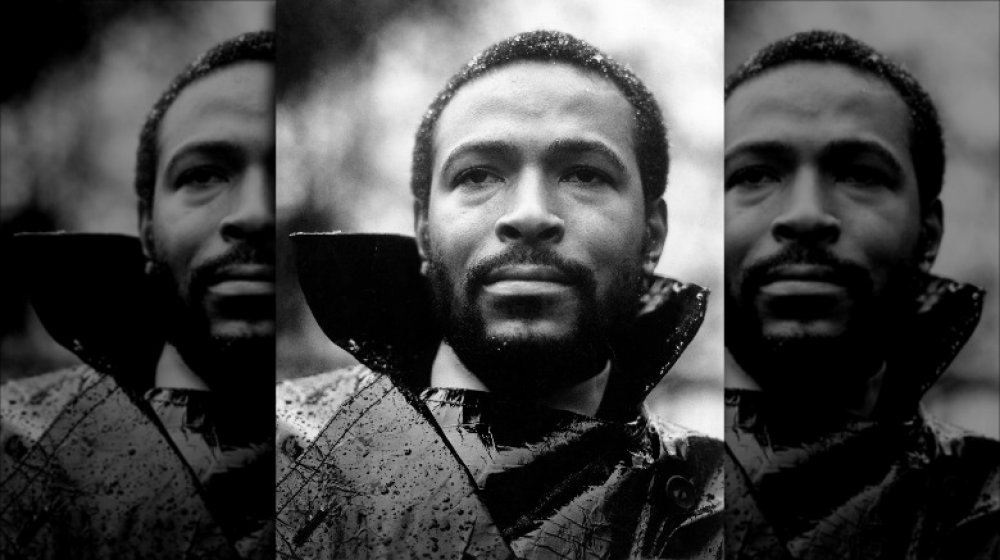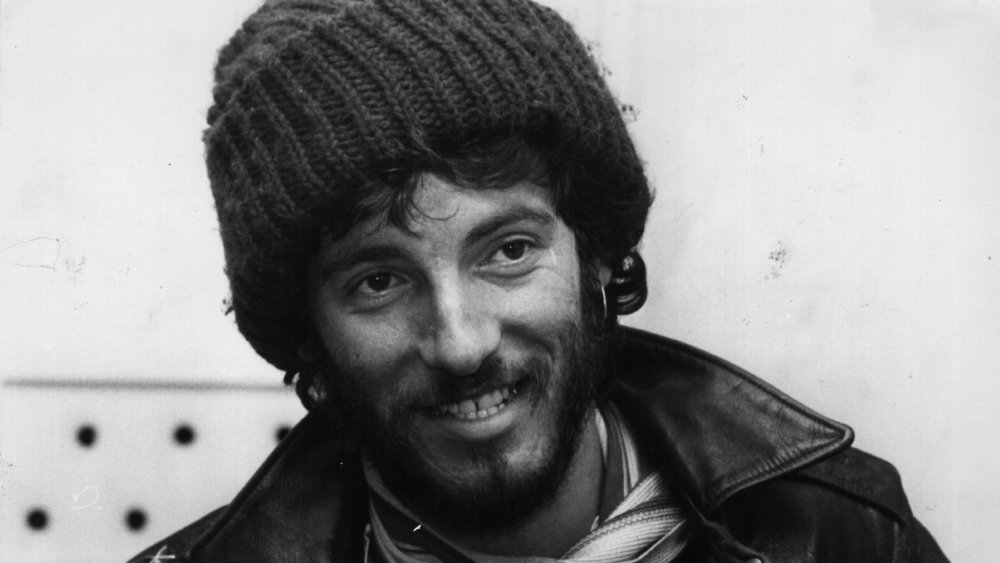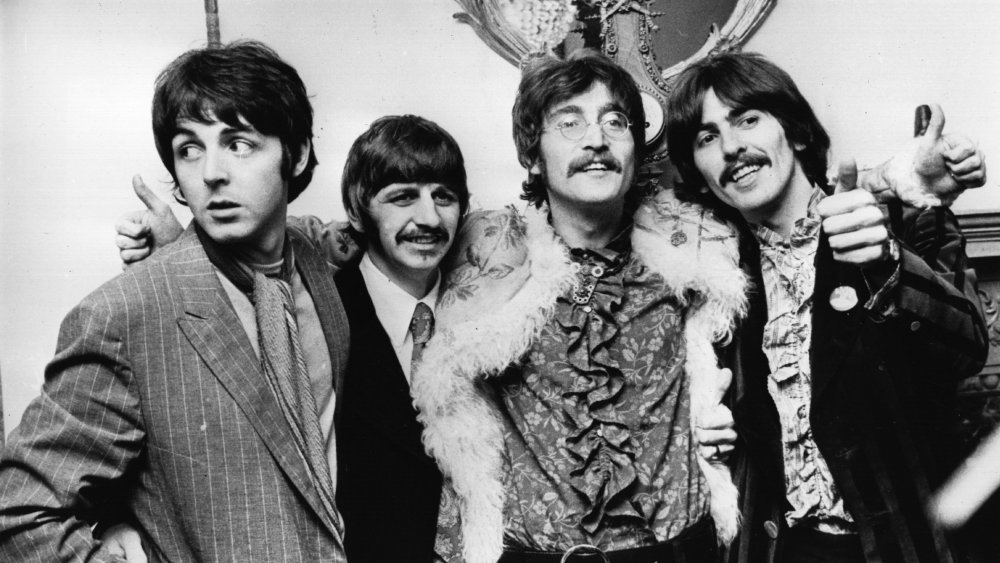Famous Albums That Almost Didn't Get Made
Even in the age of streaming, SoundCloud rappers, and viral hits, the album still holds a mythic power. Coming up with a catchy song or making an interesting video is one thing, it's quite another to carefully craft and sequence a collection of songs that are all equally good (hopefully). A great album is not just a bunch of songs, but a mood, a vibe, and sometimes even a coherent story if we're talking about a concept album.
When an album hits all these marks with consistent greatness, it's remembered long after the marketing hype dies down. Albums like Sgt. Pepper's Lonely Heart's Club Band, Dark Side of the Moon, or Thriller are still discussed and discovered today. They're timeless. But now imagine a world where they hadn't been released at all. How different would pop culture be if Hotel California or Adele's 21 had never come out?
Well, that's what almost happened with these famous albums that almost didn't get made. Each of these classic albums came very close to not existing, and the reasons behind their struggle to exist are often surprising, ranging from the expected (death, battles with record labels) to the unexpected (crises of faith, impossible standards). Whatever the reasons, one thing's certain: The world is a better place because everything eventually worked out, giving us some of the best music of the modern age.
Back in Black: Bon Scott's Death
In the summer of 1979, AC/DC released the multi-platinum album Highway to Hell. There was no doubt that the band was on the verge of superstardom, and their next album was crucial. They began working on new material almost immediately.
Then, in February 1980, lead singer Bon Scott went out on a drinking binge and died after asphyxiating on his own vomit. According to Loudwire, the band was shocked and devastated — and considered abandoning the album that would become Back in Black and breaking up. After all, Scott had been one of the key ingredients for AC/DC's success. He was the main lyricist and the voice of the band.
But then, as Rolling Stone reports, rhythm guitarist Malcolm Young decided that sitting around grieving wasn't doing anyone any good. So he called up his brother, lead guitarist Angus, and suggested they rehearse in order to distract themselves from their grief — and that led to the decision to carry on and complete the album as a tribute to Scott. They began auditioning new singers, eventually hired Brian Johnson, and the rest is history. Despite some carping from critics about moving on without Scott, Back in Black has gone on to be one of the best-selling albums of all time, and cemented the band as one of the greatest hard rock outfits in history.
Yankee Hotel Foxtrot: The record label hated it
An object lesson in how futile it can be to make predictions about the success of an album is the fourth effort from legendary alternative rock band Wilco, Yankee Hotel Foxtrot. The short version of the story is, their record label hated it so much it gave the rights back to the band and fired them.
The year 2001 was a tumultuous time in music. Record labels were merging or shutting down as streaming and digital music was establishing itself as a whole new paradigm. Wilco's label, Reprise, was owned by Time Warner, which had just merged with AOL. As reported by author Greg Kot, Time Warner had lost plenty of market shares in the music business, and there was a focus on blockbuster hits. As a result, pressure was put on Wilco to write a radio-friendly hit song. According to Rolling Stone, the label demanded changes, and when the band refused to alter their approach, Reprise flatly rejected the album and negotiated their release from their contract.
In the process, the label simply gave Wilco the rights to the album. The band streamed the songs from their website, then signed with Nonesuch Records — a label also owned by Time Warner, which means that the company paid the band twice for the album. It went on to be Wilco's biggest hit and an iconic album in alternative rock.
All The Young Dudes: Saved by David Bowie
When the band Mott the Hoople questioned breaking up in 1972, they'd been trying to find their big break for years. Their first album had gotten them some attention, but the next three sold dismally. Their fifth album, however, was the smash hit All the Young Dudes and contained the iconic title song that made the band legendary. And that album almost never came out, because the band nearly broke up.
According to UNCUT, lead singer Ian Hunter said the band split up after touring in Switzerland in 1972, saying "We were at the bottom of the ladder playing in a converted gas tank and we didn't see the point any more." Ultimate Classic Rock reports that their bassist, Pete Watts, immediately contacted David Bowie about joining his backing band (even rock stars need a job).
Bowie was already a superstar — and a fan of Mott the Hoople. He didn't want them to break up, so he sprang into action. He got them new management and a new record deal, he offered to produce their next album, and he offered them his new song "Suffragette City." Amazingly, the band rejected it. Undeterred, Bowie offered them a second song, "All the Young Dudes." The band loved it and pulled itself back together to record the album.
The Black Album: A crisis of faith
Fame and success can be fickle. You can be number one with a bullet one day, and suddenly be a dead letter the next. Even a superstar like Prince has to struggle with balancing artistic integrity with commercial performance.
As reported by Den of Geek, Prince's 1987 album Sign O' the Times had been a commercial disappointment. Worse, many critics felt that Prince had gone too pop. So Prince began work on what's become known as The Black Album, a back-to-basics record that was referred to as The Funk Bible in some press materials. It was all set for a December 1987 release. About 100 promotional pressings were sent out, half a million records were pressed— and then about a week before the album's release, Prince withdrew it.
Prince was a very spiritual person who often explored questions of faith in his music. According to Rolling Stone, his decision to pull the album stemmed from an epiphany he had involving God. He wouldn't say more, except to note that "I suddenly realized that we can die at any moment, and we'd be judged by the last thing we left behind. I didn't want that angry, bitter thing to be the last thing."
For a while, it looked like bootlegs were the only way you could hear the so-called Black Album, but it did finally get a formal release — seven years later, in 1994.
Tonight's the Night: Too grim for Neil Young fans
Today, Neil Young is an icon. In 1972, he released Harvest, which proved to be his breakthrough, establishing a polished, acoustic sound on songs like "Heart of Gold" and "Old Man." His record company hoped his next album would have continued in that vein to cement and expand his fan base.
Then, as Ultimate Classic Rock reports, fate intervened. Two of Young's best friends, Bruce Berry and Danny Whitten, died within a few months of each other. The artist was shattered, and put the album he'd been working on aside to begin work on a raw, emotionally-devastating album that addressed his feelings and grief. The result was 1973's Tonight's the Night, a bleak, rough-sounding collection of songs.
The record label was worried this was exactly the wrong album to release. They feared it would alienate his new fans who wanted more Harvest-style strumming. Young was convinced to put it aside and to work on another album, which became 1974's On the Beach. Unfortunately, it was also a pretty raw, unpolished album, and it did confuse a lot of Young's new fans.
Tonight's the Night was finally released in 1975. As Rolling Stone notes, Young wrote in the liner notes, "I'm sorry. You don't know these people. This means nothing to you."
Boston: The band didn't exist
The making of Boston, the iconic 1976 album, is an amazing story. Tom Scholz had huge dreams when it came to his music. As he told EW, he started playing guitar when he was a student at MIT and then built himself a basement recording studio. Scholz worked on songs alone in that studio, obsessively recording and re-recording parts in an effort to create the perfect song.
Scholz brought in local singer Brad Delp to lay down the vocals. According to Loudersound, they soon had a six-song demo, including the eventual smash More Than a Feeling, to shop around to music labels. Everyone turned them down — except Epic Records. Everything started to look up. Epic's team couldn't believe that the songs they were listening to were demos — they sounded like a polished, completed album. They wanted to sign the band and put out the album.
There was just one catch: The executives wanted the band to fly out and audition live. They wanted to be sure they had the real deal. This was a problem because there was no band. There was Tom Scholz, Brad Delp, and thousands of hours of tinkering in the studio. So they quickly recruited a bunch of local musicians, engaged in some whirlwind rehearsals, and managed to pass the audition with flying colors. Boston was released and "More Than a Feeling" became a staple of rock radio.
Full Moon Fever: Standoff with the label
By 1987, when Tom Petty decided to take a break from his band The Heartbreakers and record a solo album, he was a pretty big deal. He'd written hit songs and established himself as a mainstay of classic rock — he was a Traveling Wilbury, after all.
So you might think getting his first solo album released would be a piece of cake, especially when he convinced Jeff Lynne to produce it, and when you consider the long list of classic songs he wrote for it, including "Runnin' Down a Dream," "Free Falling," and "I Won't Back Down."
But as Ultimate Classic Rock reports, when Petty delivered the album to his label, MCA, they rejected it. The label bigwigs didn't think they heard any hit songs and told Petty they wouldn't release it. Petty was reportedly stunned and angry, but he bided his time. The BBC reports that after touring with the Traveling Wilburys and appearing on stages all over the world with legends like Bob Dylan and George Harrison, he brought the album back to MCA — completely unchanged — and submitted it again. Realizing they weren't going to get an alternative, MCA relented and finally released it.
Petty held a grudge, though. As Pitchfork reports, he secretly signed a deal with Warner Brothers, and the moment his contract with MCA expired, he switched labels and never looked back.
What's Going On: Berry Gordy didn't get it
Marvin Gaye's What's Going On is regarded as a watershed in soul and R&B music. It's a socially-conscious concept album that tackles many of the subjects we're still dealing with today — racism, violence, and climate change among them. But it was almost shelved because Berry Gordy, the genius behind Motown Records, thought it would be a disaster, and he tried to talk Gaye out of releasing it.
As Town and County Magazine reports, Gordy's response to hearing the song for the first time was to call it "the worst thing I ever heard in my life." Gordy told ABC News Radio years later that he thought the album was too political, and not commercial enough. Gaye was determined to release what he regarded as some of his best work, but there was only one executive at Motown that agreed with him, according to Udiscovermusic: Harry Balk. According to music writer Mark Montgomery French, Balk actually had 100,000 copies of the single released to radio stations without Gordy's permission. The song quickly became one of Motown's fastest sellers.
Realizing how wrong he was, Gordy released the album, and to his credit has never expressed anything but gratitude that he was so very wrong about the album, saying, "I was extremely happy that I released it because it was the biggest record at that time."
Chinese Democracy: Axl Rose's perfectionism
In the late 1980s and early 1990s, Guns N' Roses was the biggest rock band in the world. But by the mid-1990s, internal conflict eroded the band down to its lead singer, Axl Rose, who owned the name. As original members left, he replaced them with new musicians, and according to Rolling Stone began officially working on a new album in 1997.
Despite being an almost completely different band, the name Guns N' Roses had so much power fans were pretty excited. More personnel changes caused more delays, but Rolling Stone reports that the majority of Axl's vocals were recorded for the new songs in 2000. Rumors began to fly that a new GnR album was coming out at any moment, and fans waited in anticipation. And waited. And waited.
It would be eight more years before the disappointing and definitely anticlimactic Chinese Democracy would be released. But as Loudersound reports, Axl got lost in an endless loop chasing perfection. Every time he thought he had put together the right songs, he would start to doubt himself and re-arrange things. He hired people like Brian May of Queen to record guitar solos.
He did everything except actually finish the album. Finally, in 2008, the album dropped with much fanfare and fizzled. According to Rolling Stone, Axl blames his former manager for messing up the release.
Born to Run: Bruce Springsteen thought he could do better
It's hard to overstate how much pressure was on Bruce Springsteen in 1975. He's been critically acclaimed and lauded as Bob Dylan for a new generation. He had a devoted following for his live shows. But his first two albums hadn't sold well, and it was obvious to everyone involved that his third album had to be a hit. As Slate reports, E Street Band guitarist Steve Van Zandt said if the new album failed, "It seemed obvious that it was going to be the end of the record career."
That pressure explains both Springsteen's new approach to songwriting with what would become his breakout smash Born to Run — and a new perfectionism. It took six months just to record the title song, and 14 months to record the whole album.
And then, as The Morning Call reports, when Springsteen heard the final mix of the album he threw the tape into a swimming pool and announced he wanted to scrap the whole recording and start over. Everyone was stunned, but arrangements were made for Springsteen to drive to New York City to break the news to the label. After a few hours on the road, however, Springsteen changed his mind, and a legendary album was finally released.
Extraordinary Machine: A necessary incubation
Fiona Apple's first album Tidal was released when she was just 19. It sold well, powered by the hit song "Criminal." Her second album, When the Pawn, got better reviews but according to The New Yorker, only sold about a third as many copies. Apple contemplated retiring from music; Longreads reports she told Rolling Stone, "I just figured if the songs came to me, they came to me, and if not, 'Oh, well, it's been fun.'"
She kept writing songs, though, and by 2002 she was ready to try recording them. Her third album was announced, but by October 2004, it hadn't been released, and Apple's producing partner Jon Brion announced in an interview with Entertainment Magazine that the label had shelved the album because they didn't hear any "obvious singles."
Apple's fan base was livid. But as Apple told The New Yorker, the decision was hers — she was simply unhappy with how the songs were turning out. Those songs leaked onto the Internet, and her fans began a pressure campaign to force the label to release Extraordinary Machine. Meanwhile, Apple re-recorded much of the material with new producers. The end result is that there are essentially two versions of the album: One produced by Jon Brion that Apple deprecates, and the official album, finally released in 2005.
Let It Be: Scrapped, then ruined
When The Beatles hit the scene in the early 1960s, there had never been anything like them. Arguably the first "boy band" sensation, the hysteria they inspired was called Beatlemania. They sold millions of albums and their concerts were so noisy from screaming fans, they couldn't hear themselves play.
By the late 1960s, things had soured. After lavishly produced, psychedelic albums like Sgt. Pepper's Lonely Hearts Club Band, their 1968 album The Beatles (aka The White Album) was essentially four solo artists doing their own thing. According to Udiscovermusic, the band entered the studio in early 1969 with the idea of getting back to their simpler, rock-and-roll roots— and to record an album the way the once had, as a unit.
The so-called "Get Back" sessions didn't quite work. After recording a lot of unfinished songs, the band almost broke up as personality conflicts intervened. They broke off recording and shelved everything, only to return later in the year to work on one final album — the classic Abbey Road.
The "Get Back" album almost remained on the shelf, but according to Ultimate Classic Rock when Allen Klein became the Beatles' new manager, he hired iconic producer Phil Spector to finish the album, Spector sure did, adding strings, choirs, and other overdubs that nobody liked, and Let It Be became the band's official last album in 1970 after almost being abandoned.
